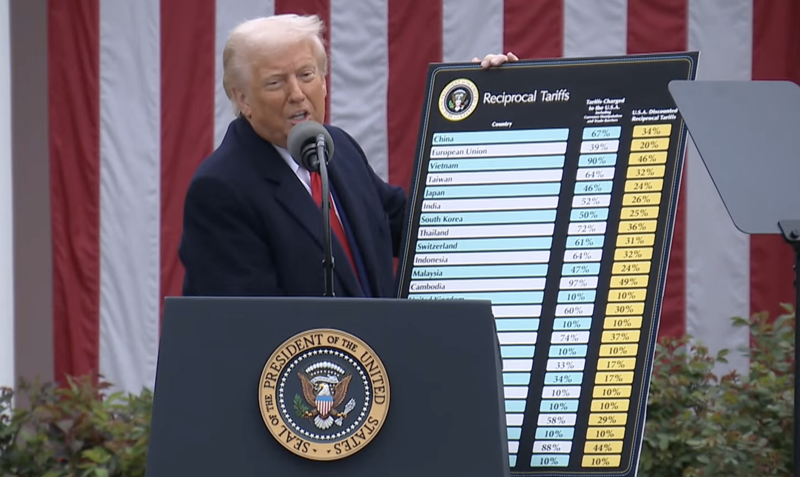A group asked permission to file a brief in a lawsuit over President Donald Trump’s tariffs, claiming the president doesn’t have the power to impose import duties after the judges rejected an emergency order to stop tariffs.
The group includes former U.S. Senators, a retired U.S. Attorney General, retired federal judges, and constitutional scholars. They claim only Congress has the authority to tax.
“The powers to tax, to regulate commerce, and to shape the nation’s economic course must remain with Congress,” the group wrote in a brief. “They cannot drift silently into the hands of the president through inertia, inattention, or creative readings of statutes never meant to grant such authority. That conviction is not partisan. It is constitutional. And it strikes at the heart of this case.”
The group wants to submit the brief in a case filed earlier this month by five business owners represented by the nonprofit law firm Liberty Justice Center. The lawsuit alleges Trump doesn’t have the power he thinks he has under the International Emergency Economic Powers Act.
One of those business owners, David Levi, said that tariffs would likely mean that his small business making STEM kits would get swallowed by copycats from China. Levi started MicroKits LLC after getting laid off in 2020. The electrical engineer and toy designer decided to create STEM kits for budding engineers in his Virginia home.
In the lawsuit, Levi said he expects to run out of inventory in about seven weeks, when he’ll likely have to pause his business. Levi said the tariffs will likely force him to raise prices, leading to a loss of revenue before the company can’t compete with products made entirely in China.
The group’s brief claims the 1977 International Emergency Economic Powers Act that Trump used to justify his tariffs was designed to curb presidential power.
“IEEPA, the central statute invoked, cannot bear this weight,” according to the brief. “Enacted in 1977 to rein in presidential overreach, IEEPA allows the president to impose sanctions in response to genuine emergencies – not to reorder the economy in response to long-term trends. Its legislative history is clear: Congress never intended it as a backdoor for permanent tax policy, nor as a means of sidestepping Article I.”
Article I of the Constitution gives Congress the power to “lay and collect Taxes, Duties, Imposts and Excises” and “regulate Commerce with foreign Nations.” A tariff is a tax on imported goods.
The amici brief follows Liberty Justice Center’s motion last week seeking a temporary restraining order, a preliminary injunction, and a permanent injunction to stop the tariffs. On Tuesday, the Court of International Trade denied that emergency relief. The court set a hearing on the motion for 11 a.m. on May 13.
Attorneys from the U.S. Department of Justice Civil Division had urged the court to reject the TRO. In its response, the federal government said the plaintiffs were unlikely to succeed on the case’s merits and weren’t entitled to a TRO.
“They provide no evidence that they have paid tariffs pursuant to the Executive Orders they seek to challenge,” the government attorneys wrote. “Nor do they show that they plan to pay any tariffs during the 14-day maximum period for a TRO.”
Trump announced a slate of what he called reciprocal tariffs on April 2, which he proclaimed was “Liberation Day” for U.S. trade. Seven days later, Trump paused those higher tariffs for 90 days as his administration seeks to make trade deals with more than 75 nations. However, Trump has maintained a 10% baseline tariff on all imports and 145% tariffs on imports from China.
The three judges in the case agreed with the Trump administration on the TRO. In the decision to block emergency relief for the business owners, the judges noted they “have not clearly shown a likelihood that immediate and irreparable harm” would occur within 14 days.
Attorneys for the federal government further argued that the businesses represented by Liberty Justice Center were unlikely to prevail.
“Congress lawfully delegated to the President authority to regulate importation through the imposition of tariffs under specified circumstances,” government attorneys wrote in a brief. “Plaintiffs’ challenge to the president’s declaration of a national emergency also fails. The correctness of a President’s declaration of an emergency is non-justiciable.”
Trump has promised tariffs will make the U.S. wealthy, bring back manufacturing jobs lost to lower-wage countries in decades past, and shift the tax burden away from U.S. families.
A tariff is a tax on imported goods. The importer pays the tax and can either absorb the loss or pass the cost on to consumers through higher prices.
Critics argue the tariffs will hurt the economy and the nation’s trading relationships abroad and mean higher prices for U.S. consumers. Trump and his backers have said tariffs would cause temporary pain, but lead to a new wave of domestic manufacturing and raise federal revenue.







